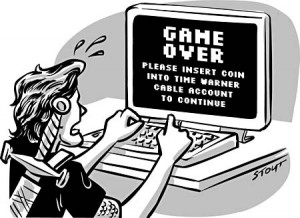At one point unlimited bandwidth was almost regarded a universal right in the United States and many other developed nations, but the growing demand for on-demand video and peer-to-peer traffic has left ISPs scrambling for ways to avoid excessive burdens on their networks. And unfortunately - for bandwidth hogs, at least - monthly download caps and overage charges have become a harsh reality.
Starting today AT&T will be enforcing hard caps on its broadband user base, the second largest of the country with approximately 16 million subscribers. DSL users will be limited to 150GB of downstream data, while U-Verse caps are a little more permitting at 250GB. AT&T plans to charge overage fees of $10 for every additional 50GB of data, though the company will issue two monthly warnings before you get billed.
Earlier this year when confronted with the question of why they were enforcing this limitation, AT&T said that less than 2 percent of their customers would be affected, and that this "top 2 percent of residential subscribers were using about 20 percent of the bandwidth" on their network. According to Wired, with the change AT&T is joining the leagues of Comcast and many other smaller ISPs around the country that are putting a price to a fixed amount of Internet usage.
Perhaps it's too dramatic to call this the return of the dial-up days, but the fact remains that over the past decade we've grown accostumed to the idea that broadband is unlimited and that no matter what we decide to do with it, it's always there so we can look up information, exchange emails, watch videos, download software, or upload content that we're backing up or wanting to share with others. Although it's easy to assume torrent users are likely within that 2% group of heavy usage subscribers, ISPs are taking more issue with video-streaming services like Hulu and Netflix.
Just last March Netflix announced lower video quality streams to counter bandwidth caps set by Canadian ISPs. Netflix estimates that an hour of standard definition video will at the very least consume 0.3GB/hour, while best quality videos will use about 1.0 GB/hour for SD or up to 2.3GB/hour when streaming HD content.
Finally, Wired shares an interesting statistic that makes it clear that bandwidth costs are not the reason ISPs are concerned about heavy data usage. "Time Warner Cable brought in $1.13 billion in revenue from broadband customers in the first three months of 2011, while spending only $36 million for bandwidth --- a mere 3 percent of the revenue. Time Warner Cable doesn't currently impose bandwidth caps or metering on its customers --- though they have reserved the right to do so --- after the company's disastrous trial of absurdly low limits in 2009 sparked an immediate backlash from customers and from D.C. politicians."
Instead it's about local infrastructures and how customers that are exceeding normal use impact neighbors' connection speeds. Nonetheless that's where things start to get messy as we throw in net neutrality in the mix along with cable companies' interest in keeping current subscribers hooked to their offerings while more content becomes available online through both free and paid services.
